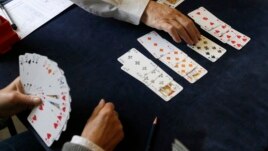01 April, 2019
Last year, top-ranked Geir Helgemo received a one-year suspension from his sport: bridge, a kind of card game for four players in two teams.
Helgemo tested positive for banned substances that are more commonly used in active sports like cycling, weightlifting, and martial arts. In fact, Helgemo had one of the same drugs in his body that Lance Armstrong used to cheat at the Tour de France.
But many observers saw Armstrong's case as a good example of how the fight against doping in sports can work. In contrast, Helgemo's suspension has drawn criticism. Critics say the suspension is evidence that anti-doping rules should not be used the same way across sports.

In this Tuesday, Sept. 22, 2015 file photo, competitors play bridge at the Acol Bridge Club in West Hampstead, London. A doping ban handed down to the top-ranked player in bridge has provoked a backlash in the card game. (AP Photo/Tim Ireland, File)
Why are bridge players being tested for drugs?
Even though bridge is a card game, the International Olympic Committee recognizes it as a sport. Officials from bridge's governing body, the World Bridge Federation, even hope to see bridge played in the Olympics one day. As a result, they follow the Olympic Committee rules for other sports. These rules include testing top players for drugs that are banned by the World Anti-Doping Agency, or WADA.
Helgemo's test took place last September at a World Bridge Series tournament in the U.S. city of Orlando, Florida. He tested positive for testosterone and clomifene. Testosterone makes muscles bigger, and clomifene is usually used to help women get pregnant. Both are banned substances under WADA rules.
The World Bridge Federation says in its anti-doping handbook for players that those drugs are "not expected to affect performance in bridge."
Boye Brogeland agrees. Brogeland is a bridge professional who won two world championships with Helgemo. When asked about Helgemo's drug test, Brogeland said, "Nobody thinks he took this [testosterone and clomifene] to get an edge at bridge."
Should bridge be part of the Olympics?
Helgemo's case has created a debate among bridge players and fans about whether bridge should be connected to the Olympics at all.
Supporters note that the connection to the Olympics helps secure funding for bridge. The financial benefits are especially important at a time when young people are more interested in playing video games than cards.
Critics question why bridge is agreeing to rules against drugs that do not make bridge players – or the game – better. "The integrity of the game is lost because we are trying to get into the Olympics," player Boye Brogeland says.
David Harris is the lawyer for the World Bridge Federation who argued against Helgemo. Harris noted that as a top professional, Helgemo had been tested before. He added that Helgemo should have been aware of the anti-doping rules and should have been more careful.
"This was an unfortunate case, but it was a careless case in many ways," Harris said. "This is a person who is earning a considerable amount of money out of playing bridge."
Helgemo did not answer Associated Press requests to speak about his case himself. Lawyer David Harris said Helgemo is currently serving a six-month prison sentence for tax offenses in Norway. The sentence is unconnected to his doping ban.
I'm John Russell.
John Leicester reported on this story for the Associated Press. John Russell adapted it for Learning English. Kelly Jean Kelly was the editor.
We want to hear from you. Write to us in the Comments Section.
_____________________________________________________________
Words in This Story
recognition – n. the act of accepting that something is true or important or that it exists
edge – n. an advantage over others
adherence – n. the act of doing what is required by a rule, belief, etc. — usually + to
discipline – n. punishment for bad behavior
panel – n. a group of people with special knowledge, skill, or experience who give advice or make decisions